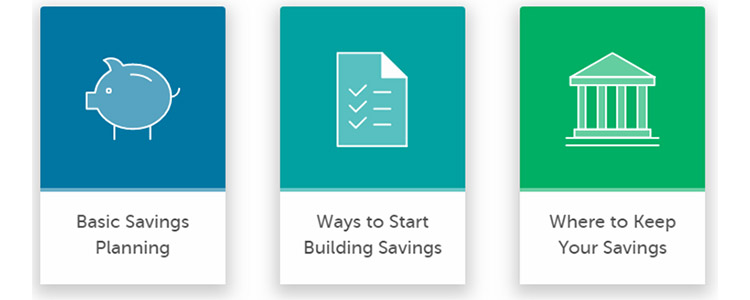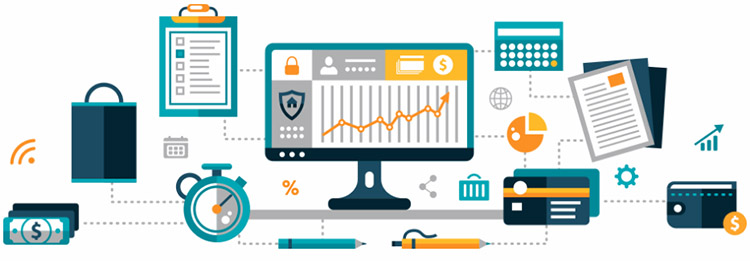Planning for Retirement: Retirement 101
Have you started saving for retirement? Have you saved enough? If you are like most people, the answer to either question is probably "no." Saving for the future is easy to put off in favor of other, more immediate, spending needs. The result of this, though, is that many people don’t have enough saved for the financial security and stability they want when it comes time to retire.
Ready to Learn More?
Watch our Retirement 101 module. It's quick and easy. Simply click the yellow button at the bottom of this page. The module will start playing as soon as you arrive on the site. Once you've listened to the introduction, click the arrow to the right of the screen to move through the different topics:
- Tools to determine how much money you will need to save for retirement.
- The power of time and compounding interest.
- Retirement plans and investment vehicles.
- Developing a plan that works for you.
Tips
Once you've started the module, you can see captions, adjust volume and pause the module by using the controls at the top right of the screen. You can also select the transcript button to see all of the content from the module.


Wherever you are in your retirement planning, it is not too late to develop or refine your savings strategy. This quick lesson will give you the understanding and tools you need to start building the retirement you want, today.
Planning for Retirement Expenses Calculator
How much will you need to cover your expenses in retirement? Use this budget planning calculator to get a sense of the funds you’ll need at different points throughout your retirement.
Ready to Get Started?
Using the Planning for Retirement Expenses Calculator is easy. Simply click the yellow button below. The calculator will have places for you to add your current age and estimated retirement age, and will project your retirement expenses based on expenses.
Check out the
Planning for Retirement Expenses Calculator Now

The Planning for Retirement Expenses calculator is for information purposes only and is not intended to provide investment, legal, tax, or accounting advice, nor is it intended to indicate the performance, availability, or applicability of any product or service.

Ready to start planning for your retirement? We can help!
Your Retirement Lifestyle and What it Will Cost
Use this calculator to estimate how your lifestyle choices in retirement, as compared to your current lifestyle, may affect your expenses.
Ready to Get Started?
Start to assess your retirement lifestyle by using our Retirement Lifestyle Calculator. It's quick and easy. Simply click the yellow button below. The calculator has sliders that you can use to answer questions about the home you'd like to have, the amount of travel you're interested in and other activities to help project your retirement lifestyle and what it could cost you.

This calculator is for information purposes only and is not intended to provide investment, legal, tax, or accounting advice, nor is it intended to indicate the performance, availability, or applicability of any product or service

Do you know what you want your "retirement lifestyle" to be? Are you planning to hit all the places on your bucket list, or maybe you're planning to relax with some new hobbies? Your lifestyle choices may have implications for your spending in retirement.
Building Emergency Savings
There are several small things you can do every day, and lots of available resources that can help you build savings without feeling like you’re missing out on life. This module will look at practical ways to help you start saving or build on steps you already take to make your money go further. With some thought and planning, building savings can be less intimidating than it seems.
Ready to Learn More?
Watch our Building Emergency Savings module. It's quick and easy. Simply click the yellow button at the bottom of this page. The module will start playing as soon as you arrive on the site. Once you've listened to the introduction, click the arrow to the right of the screen to move through the three different topics:
- Basic Savings Planning
- Ways to Start Building Savings
- Where to Keep Your Savings
Tips
Once you've started the module, you can see captions, adjust volume and pause the module by using the controls at the top right of the screen. You can also select the transcript button to see all of the content from the module.

Everyone already knows it’s important to save money; but if you’re like most people, that’s easier said than done. But saving money doesn’t have to feel like a sacrifice, and you are not alone!
Learn More About Credit Scores and Reports
Your credit score can have one of the biggest impacts on your financial life. Your credit history may be viewed by banks, cell phone companies, credit card companies and even potential employers, so understanding how it works will help you maintain healthy finances.
Ready to Learn More?
Watch our Credit Scores and Reports module. It's quick and easy. Simply click the yellow button at the bottom of this page. The module will start playing as soon as you arrive on the site. Once you've listened to the introduction, click the arrow to the right of the screen to move through the three different topics:
- What is a credit score?
- How is your credit score calculated?
- How can you help protect your credit score?
Tips
Once you've started the module, you can see captions, adjust volume and pause the module by using the controls at the top right of the screen. You can also select the transcript button to see all of the content from the module.

Credit scores and reports can be confusing and difficult to understand. We've partnered with Everfi, Inc. to help simplify this information for you!
Insurance 101
Insurance is not a "set it and forget it" decision — you’ll want to re-evaluate your needs on a regular basis or at major life events such as a new job, moving to a new area, or birth of a child. This module will explore different types of policies, how insurance works, and how it affects your money to help make sure you have the plan that works best for you.
Ready to Learn More?
Watch our Insurance module. It's quick and easy. Simply click the yellow button at the bottom of this page. The module will start playing as soon as you arrive on the site. Once you've listened to the introduction, click the arrow to the right of the screen to move through the three different topics:
- Types of policies
- Common costs
- Processing claims
Tips
Once you've started the module, you can see captions, adjust volume and pause the module by using the controls at the top right of the screen. You can also select the transcript button to see all of the content from the module.

Union Plus Life Insurance is underwritten by Hartford Life and Accident Insurance Company, Hartford, CT 06155. All benefits are subject to the terms and conditions of the policy. Policies underwritten by Hartford Life and Accident Insurance Company detail exclusions, limitations, reduction of benefits and terms under which the policies may be continued in force or discontinued. Life Form Series includes GBD-1000, GDB-1100 or state equivalent.

Insurance can help protect you, your loved ones, and your property from unexpected financial risk or loss, and is a key part of any financial plan.
AFSCME Member Endorses Union Plus
Avinger is a Clerk 3 Typist for the Fire Department. She sees her office and the people she works with as family. That’s because in her own crisis of loss, they rallied around her with uncommon love and presence.
“I’ve had several deaths in my family since I joined the Department 10 years ago – my mother, brother and oldest sister,” she said. “People I work with came to the funeral services, prayed with me, and even the city’s Fire Commissioner made sure I was all right. I didn’t feel like an employee. They didn’t have to do any of that. They just made me feel special.”
Avinger seeks to deliver that same care and sensitivity among firefighters and paramedics she serves. She encourages and prays for them as they collaborate on finalizing paperwork prior to even their entering the hospital, and sometimes, she visits them as they recover.
Devout in her faith and deeply involved in her faith community, she believes her work is an extension of how she believes others should be treated. This desire has made her a strong union member who works behind the scenes to advocate for her district’s people.
Three years ago, she also sought to advocate for herself by focusing on building up her credit. Having seen the AFSCME Advantage Credit Card Program1 information online and in the mail, she saw how easy it was to apply and went for it.
Current and retired union members, and often their family members, are eligible to apply for the Union Plus Credit Card Program. Each card has $0 Fraud Liability if your card is lost or stolen2, which means card holders can shop with confidence and be assured they are protected if the card is lost or stolen. Additionally, eligible card holders may apply for and gain access to hardship assistance grants in the event they are in need of specific help through a range of life events3.
“I use this card for everything – online purchases, grocery shopping and even get a couple dollars out every now and then with a cash advance,” she said.
Avinger believes the card can help build credit with responsible use.
“My AFSCME Advantage Credit Card works for me. I’d recommend Union Plus to any union member,” she said. “In fact, my 23-year-old son is about to start his first job, and I’ve told him I think he should consider applying for it.”
The Union Plus Credit Card is made available in partnership with Capital One. It is backed by the highly rated Capital One Mobile app, which is designed for a simple mobile experience, making it even easier to manage your account.
To learn more and apply visit theunioncard.com.

1The Union Plus Credit Card is issued by Capital One, N.A. pursuant to a license by Mastercard International Incorporated.
2$0 Fraud Liability claims are subject to investigation and verification.
3Certain restrictions, limitations and qualifications apply to these grants. Additional information and eligibility criteria can be obtained at unionplus.org/assistance.
The fire department in one Pennsylvania city averages up to eight severe structure fires each day. If a firefighter gets injured on the job, AFSCME District Council 33 member Angela Avinger processes their paperwork.
Debunking Common FICO Myths and Misconceptions
We’re here to turn that around.
The Most Common Myths About FICO Scores, Debunked:
- You Have Only One FICO Score
It turns out that you actually may have dozens of FICO Scores. The same goes for the VantageScore®, or any score for that matter, explains credit card expert John Ulzheimer, formerly of FICO and Equifax.
“The FICO is a brand, not a specific score,” says Ulzheimer. “And there are many different scores. Afterall, there are three credit bureaus and several generations of FICO's scoring software still in use today.”
These different scores may be used for different purposes. For instance, there are versions used for when you apply for an auto loan (i.e., FICO Auto Score 8), in credit card decisioning (i.e., FICO Bankcard Score 8), and for mortgage lending (i.e., FICO Score 2).
Ulzheimer further explains: “So when someone says, ‘My FICO Score is 700,’ that’s only as accurate as saying, ‘One of my FICO scores is 700 as of right now.’ “
- A Credit Score Is Part of Your Credit Report
When you order a credit report, your score isn’t actually an official part of the report. That’s why you’re not entitled to annual free credit scores like you are with credit reports, which you can get one for free from each of the three credit bureaus within a 12-month period, explains Ulzheimer.
“Credit scores, regardless whether it’s the FICO or VantageScore, are an add-on product sold along with a credit report,” says Ulzheimer. “Think about leather interior or heated seats as an upgrade to a car.” That’s why oftentimes there’s a fee you have to pay to get your credit score.
While there is typically a fee, these days many credit card companies and credit monitoring services offer a “free credit score.” Even though they are promoted as being free to you, the consumer, the company offering the free score is paying for them in some form, explains Ulzheimer.
- FICO Scores Are Used to Determine Premiums on Insurance
While credit scores can determine your terms and rates on car loans, mortgages, credit cards, and the so forth, they aren’t a factor in setting the premium on homeowners insurance and auto insurance. “Many insurance providers do leverage credit information in the decision process in granting insurance, but not FICO scores, which are designed to predict credit risk, not insurance risk,” says Tommy Lee, principal scientist at FICO.
Instead of using credit scores, lenders oftentimes look at credit-based insurance scores to assess how likely someone will have an insurance loss. That’s because research reveals a correlation between credit-based insurance scores and losses.
- FICO Scores Are Used During the Employment Screening Process
Here’s the difference: Credit reports can be used during the employment screening process when you apply for a job, but the credit scores themselves are not included on those types of reports, explains Ulzheimer.
“This is a hard one to kill,” says Ulzheimer. “So many people use the terms ‘credit score’ and ‘credit report’ interchangeably, which is why the myth persists.” Remember: a credit report is record of your credit history, whereas a credit score is an algorithm used to determine your credit risk and creditworthiness.
- Your FICO Score Factors in Your Income
Another common misconception is that the FICO® Score considers your income. The truth is that verified income is not found in the credit report, explains Lee. The same goes for the balances in your checking and savings accounts, and other assets, such as how much you have sitting in your retirement nest egg.
If you’re confused as on what the score is based on, look no further than your credit report. So think revolving loans, such as credit cards, and installment loans, such as car loans, mortgages, and personal loans.
- Married Couples Share a FICO Score
Married couples do not share credit scores or credit history. “Each partner has their own distinct credit report,” says Lee. “The only credit obligations that show on your report are those you signed up for, including those you had before you got married.”
However, if you add your spouse an as authorized user on your credit cards, while they aren’t responsible for making payments, the account will most likely will show up on their credit report. So if you’re making on-time payments, it could help build their credit score. Conversely, if you’re late, it could ding their credit.
- You Have to Carry a Balance on Your Credit Cards to Build a Credit History
Carrying a balance on your credit card — and not paying off your balances in full each month — to build your credit history is simply false, explains Lee.
“Carrying balances from month to month and incurring interest fees does not help your score,” says Lee. “ Instead, what matters is that you are keeping the balances reported in your credit file—typically your credit card statement balances—relatively low, especially in comparison to your credit limits.”
So how can you build your credit history and boost your score? As your payment history makes up 35 percent of your credit score, be careful not to make any late or missed payments. You’ll also want to keep your debt-to-limit, or credit utilization ratio, low. That’s because the second most important category in the FICO® Score calculation is your “amounts owed,” which makes up some 30 percent of the score calculation. You can use the FICO Score Planner to learn tips and tricks to reach your target score. You can also work with a nonprofit credit counseling agency to review your credit report and determine an action plan to improve your credit health over time.
No matter what the credit scoring model, it plays a huge role in determining your purchasing power as a consumer. If you have questions about the FICO Score and how it works, reach out to an expert at Money Management International today.
Jackie Lam is an L.A.-based personal finance writer who is passionate about helping creatives with their finances. Her work has appeared in Forbes, Mental Floss, Business Insider, and GOOD. She blogs at heyfreelancer.com.

The following is presented for informational purposes only and is not intended as credit repair.
While you probably know what a FICO® Score is, there may be a cloud of confusion over how it’s calculated, how to build good credit, and how it ultimately affects your life as a consumer. Don’t worry, you’re not alone. It turns out that there are pervading misconceptions about FICO Scores that just won’t die. Union families can turn to Union Plus Credit Counseling through the non-profit Money Management International (MMI).
CSEA Member Goes Back to School with Union Plus
Matthew Colwell of Escondido, California, is a goal-setter.
Colwell has been a member of the California School Employees Association (CSEA) Chapter 241 in San Dieguito, California for over 19 years and is a network technician. He feels that his lack of college degree has held him back from professional advancement opportunities in the past.
“Getting a management level job is something I’ve had as a goal for a number of years and I just haven’t been able to promote into those opportunities,” he laments.
So just weeks after Colwell saw a Union Plus email about its Free College program, he started taking classes towards a Business Management associate degree.
Colwell says, “With this education, my hope is that I can better equip myself to get one of those jobs when they become available.”
The Union Plus Free College Program partners with AFSCME and Eastern Gateway Community College to offer online courses and degree programs with no out of pocket cost to active or retired union members and their eligible family members.
Colwell notes, “One of the reasons I haven’t gone back to college until now is just the cost associated with it.”
He also emphasizes the convenience of taking online courses and admits, “If I had to go sit in a classroom and do traditional college-type coursework, I don’t know that I could do it.”
Colwell encourages his fellow CSEA members to use the program as well.
“The Union Plus Free College Program is a huge benefit – not only the fact that members are entitled to this benefit, but also their spouses and children,” Colwell concludes. “This will give the nudge to new hires who are thinking about joining CSEA.”
Learn More About the Union Plus
Free College Program or call 888-590-9009

California School Employees Association (CSEA) member Matthew Colwell hopes to get a management level job. He plans to do so by equipping himself with more education through the Union Plus Free College program. The program will allow Matthew to earn a Business Management associate degree online with no out-of-pocket costs.
Tips for Buying a Car with Bad Credit
Living without a car can be difficult. But having bad credit often stops many buyers from purchasing a new - or even used - car. With all the financial and referential requirements, it may even seem like buying a car with bad credit is impossible.
Luckily, this is not the case. There are plenty of ways to buy a car with bad credit without breaking the bank. All it takes is a little research, patience, and smart decision making.
Consider What You Need
Bad credit scores aren’t the end of the world, but they do limit your options when it comes to buying a car. Therefore, it’s incredibly important to take stock of your needs before you start your search.
For example, you will want to consider your timeline, and if can you afford to spend a few months (or even years) working to increase your score. Evaluate the road conditions on your commute, including seasonal weather patterns. Think about your hobbies, especially if you are someone who enjoys the outdoors, and look at what sort of features you may need to accommodate your lifestyle. Dependability and safety are key for every buyer and avoid unnecessary luxuries.
Check Your Credit Score
After you’ve made a thorough inventory of your new-car requirements, check your credit score. Though there are free sites that can give you a rough estimation, your FICO Score is the most accurate. A FICO Score is a three-digit number that is broken down into five distinct categories. 35 percent of that number is determined by your payment history, 30 percent from your amounts owed, 15 percent from your length of credit history, 10 percent from your credit maximum, and 10 percent from new credit.
In general, a low credit score is considered anything below 650, while an excellent score is anything in the 720 to 850 range. Average is anything between those two numbers.
You should also get a copy of your credit report, which gives both you and the loan institution, bank, or credit union a more detailed report of your credit history. Credit reports show any missed payments, debts, and lines of credit.
If you have the luxury of time, do your best to up your credit game. Make a concerted effort to decrease your debt, pay bills promptly, and turn in your rent on time. Don’t make any unnecessary purchases and beef up your savings. If you haven’t already, prepare a detailed budget with reasonable expectations. Chances are, you’ll be making monthly payments for a few years, and you’ll want to be prepared for any unexpected life changes, illness, injury, or expenses.
Do Your Research
Taking your time to do some research will save you in the long run. Interest rates fluctuate, so you’ll want to investigate current rates to determine when might be the best time to buy.
As a low-credit customer, you will be most affected by these changes, and you’ll want to be prepared. If you need some extra assistance, use a car payment calculator. You’ll also want to find a reputable dealer. Ask people you know for recommendations, read reviews on crowd-sourced forums, and check out locations with a reliable friend.
Be wary of independent sellers, and always ask for Carfax and detailed maintenance records. You don’t want to commit to a car that will ultimately cost you in the long run.
The more you can contribute to your down payment, the better off you will be. Putting down at least 20 percent will not only show that you are serious about your purchase, but it will also lower your monthly payments, taxes, interest rates, and fees. And, if you end up needing to sell the car before you’ve paid it off, you’ll decrease your chances of owing more than it’s worth.
Avoid Bad Credit Auto Loan Companies
If you can, avoid opting in for in-house financing or loan companies that specialize in customers with low credit scores. These companies often take advantage of vulnerable customers by offering low monthly payments, then slapping on ludicrously high interest rates.
Your best bet for a fair loan will be your local bank or credit union. You know them, and they know you. Chances are, you’ve been with them for a while, and they can attest to your income and financial credibility more than a third-party institution.
You may also want to consider online companies. These institutions generally offer better rates than in-house financing and can sometimes give you more reasonable offers than local banks or credit unions. They don’t have the same overhead as places with physical locations, so they have the resources to give you better rates.
However, be judicious with your search if you decide to go the online payment route. Multiple inquiries can hurt your score, so make sure you are shopping within a very brief period, no more than a month.
If all else fails, consider getting pre-approved. Dealerships can do this for you but seek the assistance of your local bank or credit union first.
Last Minute Advice
On the whole, your loan experience should be well researched, risk-free, and give you the best deal for your financial and lifestyle needs. When it comes to making the final decision, don’t get caught up in an unbelievable deal; chances are, it’s too good to be true. Be wary of scams and read all of the paperwork meticulously before you finalize your commitment. If you are able to make a large down payment, submit your monthly payments promptly, and manage your personal budget accordingly, you will be able to slowly increase your credit score. Making solid, responsible decisions now will greatly improve your prospects of future investments.
© 2018 Money Management International
Take advantage of Union Plus Credit Counseling to create a plan of action to help you pay down your debt and get back on the road to financial recovery.

Article written by Haley Kieser. Haley covers financial, home, and auto topics for notable brands. She loves reading, writing, and saving money! After college, she paid off $29k in 1 year. She believes anything can be accomplished with a plan in place.
Buying a car with bad credit is not easy. There are steps you can take to boost your credit score and get the best deal on your new vehicle. Union Plus Credit Counseling provides a free consumer credit counseling session, budget analysis and money management advice. Union members can also save time and money with upfront pricing online, a free Carfax report for most vehicles, and rebates on new union made vehicles by using the Union Plus Auto Buying program.